Archive
Earthgauge News – Nov. 12, 2017
Edition #6 of the Earthgauge News podcast for the week of Nov. 12, 2017.
A weekly Canadian environmental news podcast featuring stories from across Canada and around the world.
Join me here every Monday or subscribe in iTunes or your favourite podcast catcher.
On the show this week:
- The COP23 Climate Summit is underway in Bonn, Germany just as 2017 is likely to be the 3rd hottest year on record.
- More than 15,000 scientists have issued a new, dire warning to humanity.
- A new study says that the world can be powered by 100% renewable energy by 2050.
- The City of Ottawa’s latest draft Budget is out and the news is not all good for climate action.
- Recent state elections in the US could be good news for the climate, but it comes at a time when the Alaska National Wildlife Reserve could be opened for oil and gas drilling.
‘Climate Change: Which way out?’ with Naomi Klein, Bill McKibben, Chris Hedges, Bernie Sanders, Kshama Sawant
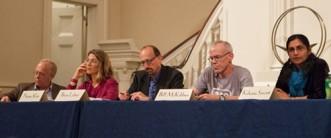
From left: Chris Hedges, Naomi Klein, Brian Lehrer (moderator), Bill McKibben, Kshama Sawant
I was fortunate to attend the largest climate change march in history on September 21, 2014 in New York City. It was an incredible experience to see roughly 400,000 in the streets demanding urgent action on the climate crisis.
The night before the event, there was a great panel discussion featuring Naomi Klein (author of ‘This Changes Everything: Capitalism vs. the Climate’), Bill McKibben (founder of 350.org), Chris Hedges (author and former New York Times correspondent), U.S. Senator Bernie Sanders, and Kshama Sawant (newly elected socialist councilor in Seattle who helped implement a $15/hr minimum wage in the city). It was an incredible night and the atmosphere at the All Souls Unitarian Universalist Church in Manhattan was electric, as you will hear.
Below are the speeches of the five panelists speaking on September 20, 2014 in New York:
Bernie Sanders – U.S. Senator from Vermont
[audio https://earthgauge.files.wordpress.com/2014/11/berniesanders-sept20-2014.mp3]—
Bill McKibben – author, activist and co-founder of 350.org
[audio https://earthgauge.files.wordpress.com/2014/11/billmckibben-nyc-sept20-2014.mp3]—
Naomi Klein – journalist and author of ‘This Changes Everything: Capitalism vs. The Climate’
[audio https://earthgauge.files.wordpress.com/2014/11/naomiklein-nyc-sept20-2014.mp3]—
Chris Hedges – author and former war correspondent for the New York Times
[audio https://earthgauge.files.wordpress.com/2014/11/chrishedges-nyc-sept20-2014.mp3]—
Kshama Sawant – Seattle city counselor
[audio https://earthgauge.files.wordpress.com/2014/11/kshamasawant-nyc-sept20-2014.mp3]
Earthgauge wins 2013 National Community Radio award!
I am thrilled to announce that I was recently awarded a 2013 National Community Radio Association (NCRA) award as the best Current Affairs / Magazine show for my coverage of the Forward on Climate rally in Washington D.C. in February of this year. Click the audio player above to hear a 10-minute sample of the program or click the link below to listen to the full one-hour show.
This show featured speeches and interviews from the huge demonstration in which roughly 40-50,000 people gathered on Washington’s national mall to urge President Obama to follow through on the commitments he made during his inaugural address in January to respond to the climate change crisis. This included speeches by Van Jones of Rebuild the Dream, Bill McKibben of 350.org, Michael Brune, executive director of the U.S. Sierra Club, and Jacquie Thomas of the Saik’uz First Nation in B.C., and interviews from the rally with Michael Brune and Canadian author/ activist Naomi Klein.
Click here to check out Earthgauge’s award-winning coverage of ‘Forward on Climate!’
EG Radio May 9: the Kalamazoo River oil spill 3 years later

Photograph: State of Michigan
This week on Earthgauge, we take a look back at what happened in Michigan in 2010 when an Enbridge pipeline ruptured spilling roughly 1 million gallons of oil into the Kalamazoo River. What is the legacy of the spill and is there anything for the rest of us to learn as we debate the construction of more pipelines from the tar sands of Alberta to B.C. and the Gulf of Mexico?
I have 3 interviews on the program today:
- Susan Connelly, a local resident of Marshall, MI where the spill occurred
- Jeff Insko, founder of the Line 6B citizen’s blog, a web site for residents who have pipelines running directly beneath their property
- Josh Mogerman, spokesperson for the Natural Resources Defence Council
We’ll also have our usual update from Kathy of Ecology Ottawa on local environmental events and campaigns.
Click the audio player above to stream the show or right click here to download.
Thanks to a fellowship from the Institute for Journalism and Natural Resources, I had the opportunity to travel to Kalamazoo and the surrounding area last week to learn about the Kalamazoo River and, in particular, the Enbridge oil spill of 2010.
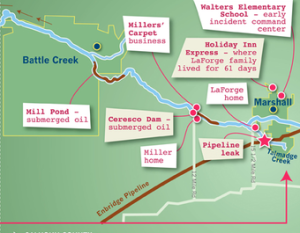
On Sunday, July 25, 2010, Enbridge Line 6B ruptured near Marshall, Mich. and released more than one million gallons of tar sands diluted bitumen into Talmadge Creek and the Kalamazoo River. Illustration by Catherine Mann for InsideClimate News.
Remember that one? It happened on July 25 just a couple weeks after BP finally sealed their leak in the Gulf of Mexico following the explosion of the Deep Water horizon oil rig that killed 11 workers.
Six inches of rain fell in the days after the Enbridge pipeline spill, raising Talmadge Creek and the Kalamazoo River into “a roiling brown torrent that overflowed its banks by several feet,” according to the seven-month, Pulitzer prize-winning investigation conducted by InsideClimate News. Talmadge Creek, which is usually five to six feet wide and a foot deep, stretched 100-feet wide after the downpour.
The spill occurred in Marshall, a community of 7,400 in southwestern Michigan. It drove 150 families permanently from their homes, yet the media spotlight never settled on their story — perhaps in part because this spill occurred 10 days after BP Plc’s Macondo well was finally capped after three months of spewing oil into the Gulf of Mexico.
Enbridge Energy Partners, a U.S. affiliate of Enbridge Inc., operated the pipeline. The company has spent more than $765 million cleaning up the spill.
Oiled sections of the Kalamazoo River reopened to the public in June 2012 — 23 months after the spill.

Photograph: State of Michigan
On today’s special show, we hear a couple different perspectives from residents who have been affected by the spill and its aftermath. First up is Susan Connelly, a local resident who was living near the oil spill when it occurred. Her kids daycare was just a half mile away so she tells us about some of the health effects her family and her community suffered immediately following the spill and in the intervening 3 years.
Susan Connelly (right click here to download):
Next we hear from another local resident Jeff Insko who started the Line 6B citizen’s blog. After the rupture of the pipeline known as line 6B, Enbridge decided to replace a huge section of pipe through Michigan, some of which runs through the property of local residents. Jeff will tell us why he has been less than satisfied in his dealings with Enbridge as they exercised their legal authority to do dig up his property and cut down all his trees in order to install new pipe. Will his experience be echoed by many other property owners as new pipelines are constructed in the coming years across North America?
Jeff Insko (right click here to download):
Finally, we hear from Josh Mogerman of the Natural Resources Defense Council on why he feels tar sands oil is much more difficult and problematic to transport through pipelines than conventional crude and how this may have played a role in the Kalamazoo spill.
Josh Mogerman (right click here to download):
First though, to get some context on what actually happened in the summer of 2010, we hear a piece from The Rachel Maddow Show on MSNBC, which was broadcast in July 2012 following the release of the US National Transportation Safety Board’s scathing report about Enbridge’s handling of the spill and their mistakes leading up to it.
Why does a pipeline rupture in Michigan matter? Well, because many plans are afoot for new pipelines from the tar sands of Alberta, including proposals through the US in the form of the Keystone XL pipeline and to the west coast of B.C. with the Northern Gateway pipeline. So today we’re going to find out about the experiences of local residents looking back 3 years later at the Kalamazoo River spill in 2010. Let’s hope we’ve learned our lessons and don’t repeat the mistakes of Kalamazoo as we debate the merits of constructing new pipelines across North America to extract even more tar sands oil at ever increasing rates.
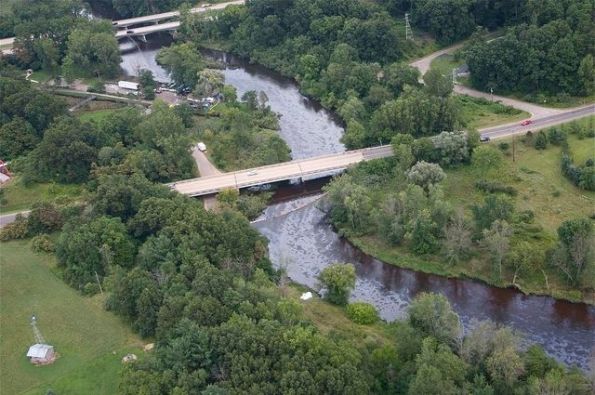
Photograph: State of Michigan
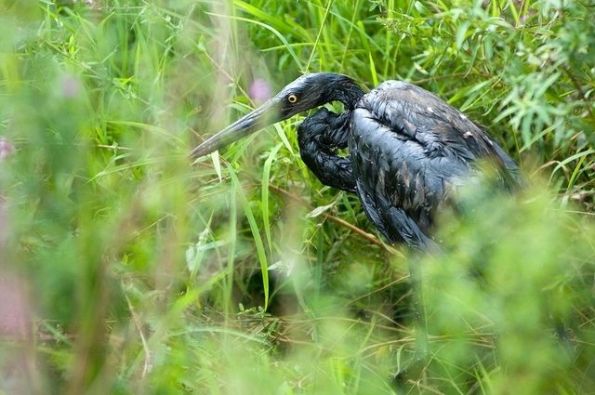
Photograph: State of Michigan
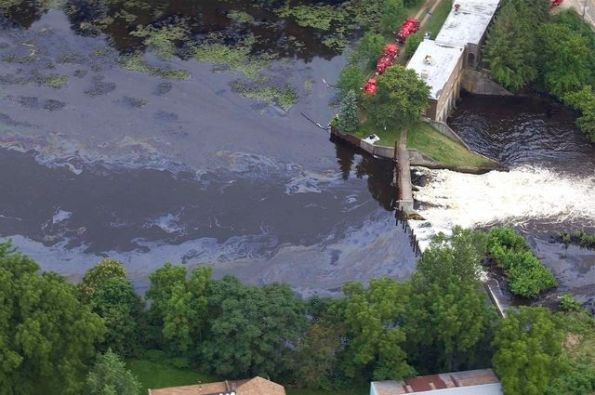
Photograph: State of Michigan
Tomorrow on EG Radio: the Kalamazoo River oil spill

This week on Earthgauge, we’ll take a look back at what happened in Michigan in 2010 when an Enbridge pipeline ruptured spilling roughly 1 million gallons of oil into the Kalamazoo River. What is the legacy of the spill and is there anything for the rest of us to learn as we contemplate the construction of more pipelines from the tar sands of Alberta to B.C. and the Gulf of Mexico?
I was in Kalamazoo and the surrounding area last week and I had the opportunity to speak with residents who have been affected by the spill and its aftermath. First we hear from Susan Connelly, a local resident who was living near the site of the spill when it occurred. Her kids’ daycare was just a half mile away so she’ll tell us about some of the health effects her family and her community suffered following the spill and in the intervening 3 years.
Next we’ll hear from another local resident, Jeff Insko, who started the Line 6B citizen’s blog. After the rupture of the pipeline known as line 6B, Enbridge decided to replace a huge section of pipe through Michigan, some of which runs beneath the property of local residents. Jeff will tell us why he has been less than satisfied in his dealings with Enbridge as they exercised their legal authority to dig up his land and cut down his trees in order to install their new pipe.
We’re also going to get an overview of the incident from Rachel Maddow of MSNBC who did a feature last summer when the US National Transportation Safety Board issued a scathing report about Enbridge’s handling of the spill and their mistakes leading up to it.
Of course we’ll also have our usual update from Kathy of Ecology Ottawa on local environmental events and campaigns. That’s at around 7:50.
Tune in tomorrow!
EG Radio April 25: The Future of Cities | Bike to Work month | Thomas Lovejoy
This week on Earthgauge, we have a veritable green medley with a jam-packed show covering everything from urban sustainability, climate change, biodiversity, biking to work and even the latest green news. I have 4 features today:
- Presentation by Alex Steffen called The Shareable Future of Cities
- Alex Smith’s interview with Dr. Thomas Lovejoy on biodiversity and climate change
- My interview with Jamie Stuckless of EnviroCentre on Bike to Work month in Ottawa
- This week’s green news from BradBlog.com
We also have our usual update on local environmental events and campaigns with Kathy of Ecology Ottawa. This week, Kathy also gives us some great cycling tips as we haul out the bikes after a long winter and welcome the arrival bike season.
Click the audio player above to stream the show or right click here to download.
Part 1 – Alex Steffen
First we’re going to pick up where we left off last week. During our last show, we talked about urban sustainability and the City of Ottawa’s Greenhouse Gas Roundtable. This week we start by hearing a presentation by Alex Steffen called The Shareable Future of Cities. Alex is a self-described Planetary Futurist and you’re going to want to hear what he has to say about the future of cities in an age of climate change.
Do you ever wonder whether we should be optimistic or pessimistic about the future? If you want more reasons to think things may still turn out for the better, Alex Steffen’s your man. He doesn’t downplay the scope and scale of the problems we face. Instead, he shows that we have the tools within our grasp for meeting those massive challenges, if we have the will to use them.
Steffen is a journalist, founder of Worldchanging.com and he edited an internationally best-selling book surveying innovative solutions to the planet’s most pressing problems: Worldchanging: A User’s Guide for the 21st Century. His most recent work is Carbon Zero, a book describing cities that create prosperity not climate change, accelerating their economies while reducing their climate emissions to zero.
Part 2 – Thomas Lovejoy
Next we hear from our friend Alex Smith of Radio EcoShock in Vancouver who recently spoke with the father of biodiversity, Thomas Lovejoy. Back in 1980, Dr. Thomas E. Lovejoy introduced the term “biological diversity” to the world. He has advised the United Nations, the World Bank, and 3 past Presidents and he’s a tireless advocate for endangered ecosystems that have no voice of their own. Lovejoy talks to Alex about the impacts of climate change on global biodiversity.
Part 3 – Bike to Work Month
Interview with Jamie Stuckless (right click here to download):
[audio https://earthgauge.files.wordpress.com/2013/04/jamie-stuckless-envirocentre-eginterview-04-25.mp3]May is Bike to Work month in Ottawa so I speak with Jamie Stuckless of EnviroCentre. On behalf of the City of Ottawa, the folks at EnviroCentre are organizing this annual event that encourages people to commute by bike and experience all of the health, economic and environmental benefits. Bike to Work month kicks off the spring season by encouraging seasoned riders and beginners to dust off the bikes and leave the car at home. You can even join the prize contest by visiting www.biketoworkottawa.com.
Part 4 – Green News
Next we turn it over to our friends Brad Friedman and Desi Doyen of BradBlog.com for the week’s listing of green news. On this episode, Brad and Desi discuss the 3rd anniversary of BP’s Oil Disaster in the Gulf; the US Environmental Protection Agency slamming the State Department’s Keystone XL report; and the release of environmental activist Tim de Christopher who was freed on Earth Day.
Part 5 – Bike tips and local environmental events and campaigns
Kathy’s bike tips (right click here to download):
[audio https://earthgauge.files.wordpress.com/2013/04/biketips-ecolottawa-kathy.mp3]
In addition to our usual weekly round-up of environmental events from Ecology Ottawa, this week Kathy also gives us some great biking tips to keep in mind as the spring and summer biking season gets underway.
Earthgauge Radio airs every Thursday morning at 7:00 AM on CKCU 93.1 FM in Ottawa and online around the world at www.ckcufm.com. Ottawa’s only radio program dedicated exclusively to environmental news and commentary from Ottawa, across the country and around the world. Podcasts on iTunes and right here on earthgauge.ca.
EG Radio April 18 2013: Earth Day special | Ottawa takes on climate change
This week we celebrate Earth Day and look at why cities are so important in the fight against climate change. I have two features on the program today:
- Interview with Jed Goldberg, president of Earth Day Canada
- Presentation by Alex Wood of Sustainable Prosperity from the City of Ottawa Greenhouse Gas Roundtable
We also have our usual update from Kathy of Ecology Ottawa on local environmental events and campaigns.
Click the audio player above to stream the show or right click here to download.
Part 1 – Earth Day
This Monday is Earth Day so we kick off today’s program by speaking with the president of Earth Day Canada, Jed Goldberg. He tells us what is being planned for this year’s event and we discuss the role of Earth Day activities at a time when many environmental problems around the world seem to be getting worse.
Every year on April 22, more than one billion people take part in Earth Day. Across the globe, individuals, communities, organizations, and governments take action to raise awareness about the importance of environmental protection. This will be the 43rd anniversary of Earth Day. From Beijing to Cairo, Melbourne to London, Rio to Johannesburg, New Delhi to New York, people are demanding that our so-called “leaders” act boldly.
But does any of this make a difference? After all, many environmental problems have gotten worse since Earth Day began back in 1970. The first Earth Day led to many tangible steps forward in environmental protection but, as Nicholas Lemann wrote in The New Yorker just a few days ago, “the original Earth Day remains a model of effective political organizing” but “(t)oday’s big environmental groups recruit through direct mail and the media, filling their rosters with millions of people who are happy to click “Like” on clean air. What the groups lack, however, is the Earth Day organizers’ ability to generate thousands of events that people actually attend—the kind of activity that creates pressure on legislators.”
We’ll find out what Jed Goldberg thinks about all this. Is Earth Day still relevant and effective in raising awareness and changing behaviour?
Part 2 – The City of Ottawa takes on climate change (again)
Did you know that cities in Canada are either directly or indirectly responsible for roughly 45% of this country’s greenhouse gas emissions? Cities have a huge role to play and any solution to climate change will have to involve action at the municipal level. In fact, with an absolute absence of federal measures to reduce GHGs or to set virtually any climate change policy whatsoever, it is the cities that are increasingly filling the policy void in Canada.
The City of Ottawa wants to be a leader in the fight against climate change and on March 23, Ottawa hosted its first ever Greenhouse Gas (GHG) Roundtable Roundtable. Last year, City Council committed to host the Roundtable to kick-start the review and update of the 2004 Air Quality and Climate Change Management Plan. The 2004 Plan set GHG reduction targets for 2008 and 2012 and work is scheduled to commence mid-year to determine whether the City and the community-at-large targets were met. Following that, the City’s work will focus on setting new targets and updating the plan with support from the City of Ottawa’s new Environmental Stewardship Advisory Committee.
The keynote speaker at the Roundtable was Alex Wood of Sustainable Prosperity, a national green economy think tank. SP focuses on market-based approaches to build a greener, more competitive economy. It brings together business, policy and academic leaders to help innovative ideas inform policy development. Alex Wood is the senior director of policy and markets at SP and he explains why climate change is such an important issues for cities.
Earthgauge Radio airs every Thursday morning at 7:00 AM on CKCU 93.1 FM in Ottawa and online around the world at www.ckcufm.com. Ottawa’s only radio program dedicated exclusively to environmental news and commentary from Ottawa, across the country and around the world. Podcasts on iTunes and right here on earthgauge.ca.
EG Radio April 11, 2013: Our 50th show! EcoBricks, Ontario Home Comfort and Rachel Carson
This week marks our 50th program since Earthgauge Radio was launched in the fall of 2011! So we’re celebrating a big milestone today and are sending out our thanks to all the guests we’ve had in the past year and a half, the numerous people who have contributed to the show, the whole CKCU radio family and of course to our faithful listeners for tuning in every week either live, online or by podcast.
On the program this week, we discuss Eco-bricks, saving energy (and money!) on home heating and the 50th anniversary of Rachel Carson’s book ‘Silent Spring’.
We also have our usual update from Kathy of Ecology Ottawa on local environmental events and campaigns.
Click the audio player above to stream the show or right click here to download.
Part 1 – Eco-bricks in Guatemala
(Right click here to download file)
Earthgauge contributor Xerez Bridglall brings us her interview with two Carleton University undergraduate students who participated in the Alternative Spring Break (ASB) program this year. ASB is an immersive year-long program that culminates with a week of cultural exchange and community service over reading week in February. Mario Pizzuto and Megan Stacey went on the ASB trip to Guatemala where they were involved in building a structure made out of eco-bricks, an environmentally friendly, additive free pressed kiln dried hardwood sawdust bricks used for home heating fuel in wood burning stoves, wood burning fireplaces and outdoor fire pits.
Part 2 – Saving energy and money at home
Right click here to download file.
James Keena of Ontario Home Comfort tells us about some ways for homeowners to upgrade to more energy efficient furnaces and hot water tanks, which can save you hundreds of dollars every year in energy costs and reduce your environmental footprint. You may also be eligible for additional government and Ontario Power Authority rebates.
Part 3 – 50th anniversary (sort of) of Rachel Carson’s ‘Silent Spring’
In honour of the 50th anniversary of the groundbreaking book ‘Silent Spring‘ by Rachel Carson, a book that many believe launched the environmental movement in the 1960s, today we feature a Democracy Now! interview with renowned author and environmental health activist Sandra Steingraber who reflects on the significant impact the book has had over the years.
‘Silent Spring’ documented detrimental effects of pesticides on the environment, particularly on birds. Carson accused the chemical industry of spreading disinformation, and public officials of accepting industry claims uncritically. When the book was published, Rachel Carson was already a well-known writer on natural history, but had not previously been a social critic. The book was widely read and inspired widespread public concerns with pesticides and pollution of the environment. Silent Spring facilitated the ban of the pesticide DDT in 1972 in the United States.
Earthgauge Radio airs every Thursday morning at 7:00 AM on CKCU 93.1 FM in Ottawa and online around the world at www.ckcufm.com. Ottawa’s only radio program dedicated exclusively to environmental news and commentary from Ottawa, across the country and around the world. Podcasts on iTunes and right here on earthgauge.ca.
EG Radio this week: EcoBricks, Ontario Home Comfort and Rachel Carson
On Earthgauge Radio this week, Xerez Bridglall will bring us her interview with two Carleton University undergraduate students who participated in the Alternative Spring Break (ASB) program this year. ASB is an immersive year-long program that culminates with a week of cultural exchange and community service over reading week in February. Mario Pizzuto and Megan Stacey went on the ASB trip to Guatemala where they were involved in building a structure made out of eco-bricks, an environmentally friendly, additive free pressed kiln dried hardwood sawdust bricks used for home heating fuel in wood burning stoves, wood burning fireplaces and outdoor fire pits.
Also on the show, I’ll be speaking with James Keena of Ontario Home Comfort. OHC offers ways for homeowners to upgrade to more energy efficient appliances such as furnaces and hot water tanks, which can save you hundreds of dollars every year in energy costs and reduce your environmental footprint. You may even be eligible for additional government and Ontario Power Authority rebates. We’ll find out more about this great program in my interview with James.
Finally, given that 2012 was the 50th anniversary of the groundbreaking book ‘Silent Spring‘ by Rachel Carson, a book that many believe launched the environmental movement in the 1960s, we’ll feature a Democracy Now! interview with renowned author and environmental health activist Sandra Steingraber who reflects on the significant impact the book has had over the years.
Earthgauge Radio airs every Thursday morning at 7:00 AM on CKCU 93.1 FM in Ottawa and online around the world at www.ckcufm.com. Ottawa’s only radio program dedicated exclusively to environmental news and commentary from Ottawa, across the country and around the world. Podcasts on iTunes and right here on earthgauge.ca.
This week on EG Radio: Guest host Chris White on environmental cancers and media coverage of the climate crisis
Tomorrow on EG Radio, guest host Chris White will be broadcasting part of an NPR interview with Wen Stephenson on the coverage of climate change in the mainstream media. Stephenson was senior producer of the NPR program On Point. He was also an editor at the Boston Globe and the Atlantic before becoming a climate change activist. He now says that journalists have failed miserably in covering climate change and he wrote an article about this recently, which has generated a lot of attention and controversy.
Chris will also be playing my interview with Connie Engel of The Breast Cancer Fund. Most of the focus of cancer awareness and fundraising campaigns these days is on “finding a cure” while the prevention side of cancer is often ignored. Why have breast cancer rates among young women been increasing significantly in recent years? Does it have anything to do with a commensurate rise in levels of toxins and chemicals in the products we use on a daily basis? Some researchers believe there is a link. Just a few months ago, Dr. James Brophy of the University of Windsor appeared on Earthgauge Radio to discuss his groundbreaking study demonstrating that women working in particular occupations have an increased risk of developing breast cancer, likely due to exposure to toxic chemicals and environmental pollutants.
Connie Engel is the Program Coordinator at the Breast Cancer Fund and is an expert on the conjunction of science and advocacy in the environmental breast cancer movement. The Breast Cancer Fund is a non-profit organization that works to connect the dots between breast cancer and exposures to chemicals and radiation in our everyday environments. Their goal is to help transform how our society thinks about and uses chemicals and radiation, with the goal of preventing breast cancer and sustaining health and life.
Earthgauge Radio airs every Thursday morning at 7:00 AM on CKCU 93.1 FM in Ottawa and online around the world at www.ckcufm.com. Ottawa’s only radio program dedicated exclusively to environmental news and commentary from Ottawa, across the country and around the world. Podcasts on iTunes and right here on earthgauge.ca.